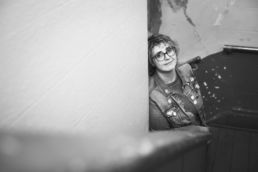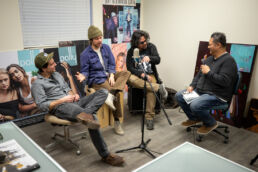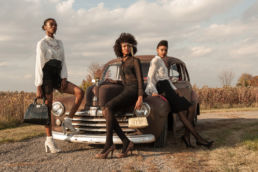words KAMI LERMA | portraits of lisa ANGIE LIPSCOMB | photography LISA SULLIVAN
TW: domestic abuse
Some people do big things quietly, shying away from the spotlight and working their magic in the shadows. Lisa Sullivan, photographer and founder of the Women’s Groovement, is one. While dodging attention and shielding herself with humor, she has been shooting from behind the camera and giving back to the community. Lisa admits that stepping out, speaking out, and sharing her story ignites her fears, but she is ready.
Grandma Betty and the Jukebox
Having working parents, Lisa split her days between her two sets of grandparents, but she lived for the times that she could be at Grandma Betty’s. In the small town of New Castle, Indiana, Grandma Betty ran a restaurant out of her home, but if the wrong person would ask about it, she was “just having people over for food.” Lisa’s aunts were the waitresses, and Lisa was the jukebox girl, a privilege that allowed the preschooler to learn her letters and numbers as she put nickels in the jukebox and selected songs for the customers. The music that played worked its way into Lisa’s soul.
Grandma Betty always wore a checkered housecoat and would sometimes be seen answering the front door brandishing a cast-iron skillet, because friends all knew that the main entrance to the restaurant was through the back door in the kitchen. Lisa soaked up the environment, but when she got underfoot, Grandma Betty would slip her a hunk of raw hamburger to munch on to keep her out of the way.
“She didn’t take lip from anyone. She was brash and would tell it like it was.”
A move to Indianapolis just as Lisa was entering kindergarten meant that she no longer got to see Grandma Betty during the week, a devastating blow to the young girl who relished her time with her hero. A few years later, Grandma Betty passed away.
“She was my life. I was devastated.”
Only, Lonely, but Loved
After Indianapolis, Lisa and her parents moved several more times. She found herself in a perpetual cycle of changing schools and making friends. “I would finally win them over and then we’d move. It was really stressful. I was never in a school for more than two years until I was twelve.”
Lisa often felt lonely as an only child, but she had her parents in her corner. Even in the more difficult times, the three of them had a strong connection. Her father was the memory keeper in the family. “He would tease me when I was having ‘moments,’ to lighten the mood and try to make me smile. He would follow me and capture me crying—capturing emotions on film. All of these emotions of little me exist. I would take a camera with me everywhere I would go because of that.”
Lisa also witnessed her mother’s strength and tenacity, most remarkably noted as her mother fought a battle that nearly took her life. “She got breast cancer at thirty-seven. I was fifteen. It was awful. But we would make fun of our hardships because laughter was what helped.”
Held up by their family’s own brand of medicine, Lisa’s mother can now boast that she has had a longer life span after the cancer than she had leading up to it.
Humor Can’t Fix Everything
She thought he was the love of her life. He gave her a place to land during her last months of high school when her mother’s promotion spurred her parents’ move to Pittsburgh. They had agreed to let her stay behind to finish her senior year. Shortly after graduation, Lisa learned that she was expecting her first child, David. Sixteen months later, her daughter Katie arrived. But happy memories of becoming a mother are tainted by abuse at the hands of the children’s father.
Lisa recounts, “It was mostly verbal abuse when he was drinking when it started. He had complete control [of our lives]. I couldn’t leave.”
To pave her escape route, Lisa got trained as a medical assistant and found a job. “I wanted to get out then because he had gotten really violent when I was pregnant with Katie.”
The most harrowing incident happened when Lisa’s pregnancy was eight months along. “He put his hand on my mouth so hard that he left an indentation. And then he put the other hand on my throat. I had to pretend to pass out so he’d stop. I just went limp. [I thought] ‘If I fight, he’s going to keep going.’”
Eventually she left the relationship but found herself caught up in the net of a small community where everyone knew everyone else, and life looked the same no matter where she looked. She felt trapped, so she took him back after a six-month separation when he proclaimed to have stopped drinking. They were married and then divorced before the engagement ring was paid off.
The Climb
The newly single parent was determined to make a fresh start for herself and her kids. Life was hard, but she was strong and determined. Things were going well in this new space she created. It was there that she met Bill, the man who is now her husband.
“Bill noticed that I always had a camera with me. We started to explore together and take pictures. He started drifting off into waterfalls, landscapes, and nature, and I drifted toward abandoned things and people. He likes the big picture, while I like the up close pictures.”
Their love for photography in the big-small town of Cincinnati introduced Lisa to Chris Breeden, then general manager and now co-owner of Arnold’s Bar and Grill. Breeden invited her to be in a photography exhibit at the restaurant, which turned into a monthly curated exhibit featuring local photographers.
Lisa began serving at Arnold’s as well and was immersed in the music of the live bands that played there regularly. One night, Buffalo Wabs and the Price Hill Hustle took Lisa on an emotional trip through space and time back to Grandma Betty’s.
“I was transported. They were the first band that I ever took photos of. I approached them and they agreed.”
Then came the Good People Festival, who presented Show Your Love: A Benefit for WNKU at the Southgate House in honor of the beloved radio station’s thirtieth anniversary. Lisa photographed every band that she could that weekend, placing herself officially in the Cincinnati music scene.
The Beginning of a Groovement
Lisa’s photography garnered a lot of attention, plus a podcast interview with Herzog Music’s Lost on the River. From this momentum came two collaborative shows at Herzog featuring Lisa’s images on the walls and the musicians whose images she captured playing live sets onstage.
“F” Bomb – Females of Folk and Funk was the second show. The event began as a photo exhibit at Herzog featuring Lisa’s portraits of prominent female musicians from the Cincinnati area and continued later that evening across the river with a massively successful show that filled all three rooms of the Southgate House Revival, with fans there to hear the women featured in Lisa’s work.
The ball was rolling, and Lisa wasn’t looking to stop. Spurred on by conversations with like-minded difference makers and the excess time that came with being laid off from her day job, Lisa was ready to double down and take the next leap.
“I was texting with Morgan Earley from Inhailer [Radio] – from Folkin’ Around—and I told her I wanted to focus on female musicians. I said I wanted to get a groove going like the women’s movement . . . the Women’s Groovement! It became a thing.”
The nonprofit was born with the purpose of connecting female artists so that they can support each other, collaborate, and create art and music events. The funds from these events are used to develop mentoring programs, establish scholarships, and sponsor other charitable organizations in the community that give assistance to women and children pursuing their dreams.
The first annual Women’s Groovement Music Festival was held at Arnold’s Bar and Grill and lasted for two spectacular nights. Headlining this momentous occasion were two female supergroups, the Lady Parts and Dirty Birds, formed just for this occasion through the power of collaboration. Although the pandemic has prevented further performances, the potential is gathering for what will be an unforgettable resurfacing.
Jericho Roses
No longer in the shadows, Lisa’s light is beckoning others who have experienced domestic abuse to lend their voice to Jericho Roses, a book in the making. It is a collection of stories from those who are taking back their power and shifting the narrative for those who are following behind. The title is inspired from the rose of Jericho, the resurrection plant with a seemingly supernatural ability to come back to life after drying out, curling up, and blowing around like a tumbleweed. But once this plant reaches a source of water, it unfurls and reveals its stunning beauty.
The project was inspired just before the pandemic, after Lisa saw a photo of a casual friend on Facebook – with a black eye. Lisa moved into action, lending emotional support as well as her talent for photography, documenting her friend’s bruised and battered body to fuel the court case.
“Those are the most important pictures I have ever taken.”
Lisa stayed in connection with the friend as she navigated the first steps that follow leaving an abusive relationship. Lisa began to realize the healing she herself felt from having an open dialogue about her own experience. Even more, she wanted others to feel safe enough to talk about what had happened to them; she wanted to facilitate a collective healing. Lisa moved into this space with her eyes wide open. “There are not a lot of women who are ready. There can be several hundred different reasons why she may not want to talk.”
She continues to move forward in collaboration with experts in the field of domestic abuse, collecting stories of those who are ready to share. Plans for publishing this book and for creating more opportunities for healing through the Women’s Groovement are in the works. “Women’s Groovement and Jericho Roses will go hand in hand.”
And This is for the Children
“I would really like to re-meet myself,” Lisa says about the disappointment over no longer having her childhood journals. “I loved to write as a kid, and [now] I have begun to write my stories for Jericho Roses. Sadly, if we didn’t have enough stories for the book, then I have plenty of stories to share about me.”
Lisa remembers being sexually harassed as a five-year-old. The instigator was seven. “I tried to fight back and [I] hit another kid with my umbrella by accident. I was the only one who got in trouble that day.”
This memory is one reason Lisa wants to touch children’s lives early. She is looking forward to creating opportunities to provide life lessons about compassion and empathy to children. “We have to start with the little ones. [We just have to figure out] how we [are] going to reach them.”





